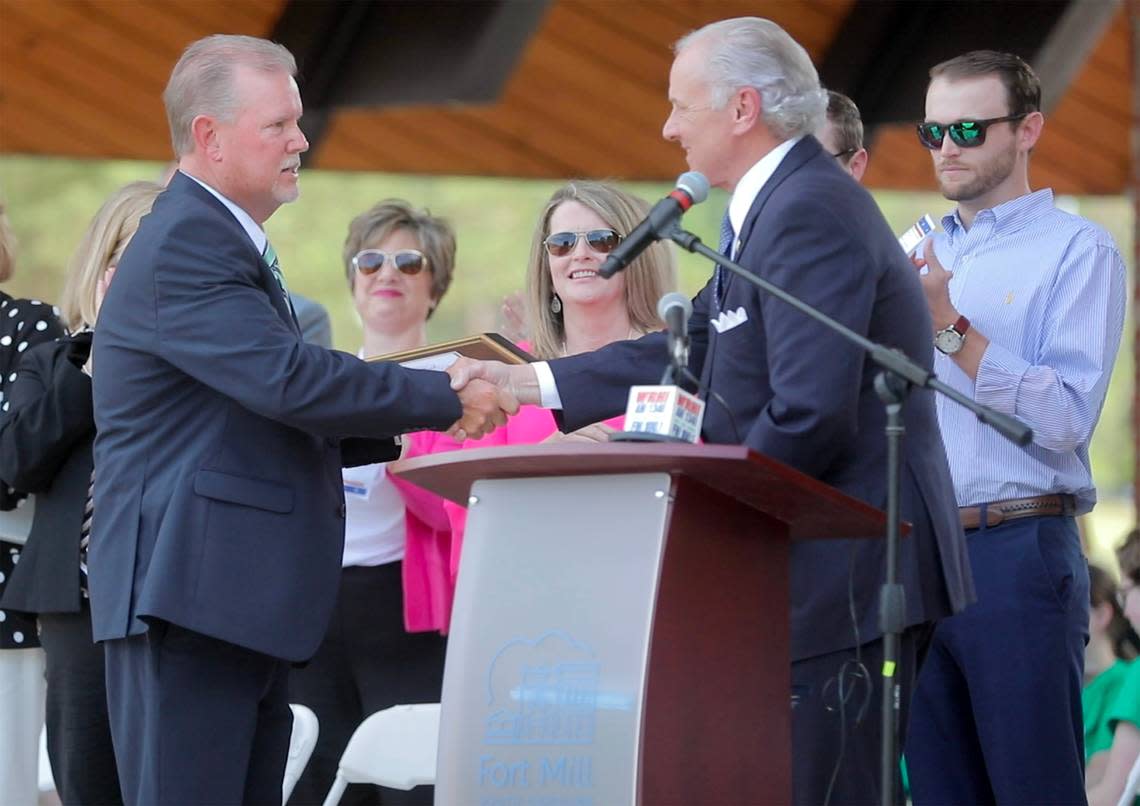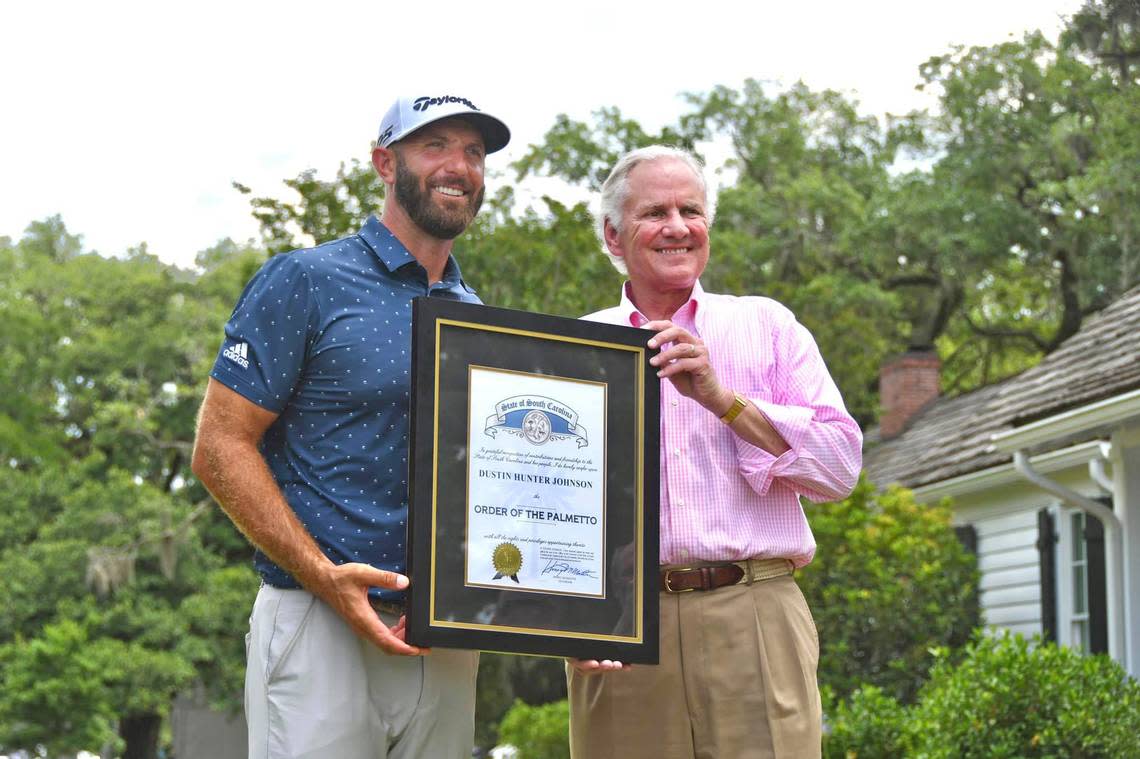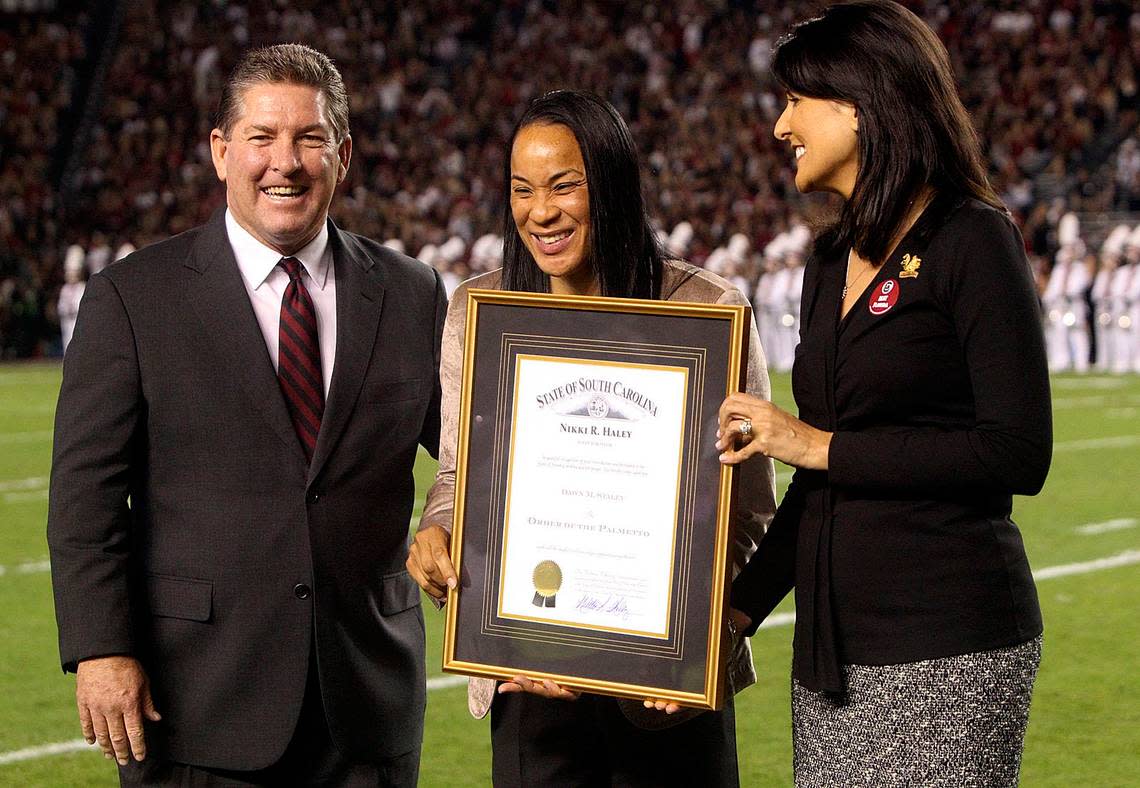It’s SC’s highest civilian honor, but have governors devalued it by handing out too many?
South Carolina’s highest civilian honor has been awarded to athletes, state lawmakers, religious leaders, retired military personnel and police officers.
It’s been used to curry favor with voters and to reward longtime employees and agency directors.
Rosa Parks, Ray Charles, author Pat Conroy, L.A. Dodgers manager Tommy Lasorda and two-time presidential candidate Ross Perot each have one. So does the “Terminator” and former governor of California, Arnold Schwarzenegger.
The state’s Order of the Palmetto was created to honor and recognize a native or resident South Carolinian’s lifetime of extraordinary achievement, service or contributions on a statewide level.
But records dating back to 1971, when the state’s highest civilian honor was first created, show that every governor has handed them out differently, and it’s been up to their discretion who gets it and how many they give out. So many have been given out, at least 67 people have received the once-in-a-lifetime honor more than once.
At least one former governor says he worries the value of the award is dropping, suggesting a more specific process be established to ensure the honor stays of value.
“I think there is an issue of giving it out too much,” said former Democratic Gov. Jim Hodges, who bestowed the honor 371 times during his one term in office. “I’m not here to criticize the number that everyone else has given out. That’s why I think when you set up a process for it, that people have confidence that it’s fair and it’s thorough, I think that ensures it has greater value to the recipients.”

‘We have a lot of special people in this state’
In 1971, Democratic Gov. John West had an idea.
The Camden native wanted to honor and recognize extraordinary achievement and industrialists who opened facilities in South Carolina.
So he created an award that would do just that, handing out the framed honor to businessmen, military officials and legendary singer James Brown, a native of South Carolina.
In his four years in office, West bestowed the honor 201 times — on the low end compared with his successors.
Every governor has full discretion over who they choose to hand the honor to. And former administration officials told The State their methods also differed.
Republican Gov. Carroll Campbell, who served eight years from 1987 to 1995, handed the award out 930 times. Second highest was former Republican Gov. David Beasley, now the world food chief for the United Nations, who awarded the Order of the Palmetto 771 times during his one term.
Former Democratic Gov. Dick Riley awarded 690 orders in eight years.
Gov. Jim Edwards awarded the honor 246 times from 1975 to 1979.
And in former Republican Gov. Mark Sanford’s two terms, he gave the award 507 times, according to S.C. Department of Archives and History.
“It was perceived as the highest honor the state could award someone,” said Warren Tompkins, Campbell’s chief of staff for five years, who said Campbell’s administration had a review process that included checking for any previous criminal history or questionable business dealings to prevent the award from being devalued.
“Yeah, you put value on it, but, then again, a lot of administrations toward the end, they sort of wholesale game while they’re going out the door. That’s going to happen,” Tompkins said.
In addition to the Order of the Palmetto, the governor also could award the Order of the Silver Crescent, an honor created by Beasley and modified by Hodges. It recognizes residents for their community service and volunteerism on the local level.
Gov. Henry McMaster this year also created the Honorary Sandlapper award to recognize out-of-state residents who have made significant contributions to South Carolina.
Staffers from previous administrations who later advocated for someone to receive the order say McMaster’s process is tougher than previous administrations.
McMaster, who is seeking his second full term in office, has so far given out about 370 framed Order of the Palmetto awards, well below the pace of several of his predecessors, but more than the 245 times former Republican Gov. Nikki Haley awarded the honor during her six years in office.
In McMaster’s tenure, he’s has awarded the honor to former Democratic and Republican lawmakers, charity leaders, pastors, retiring college administrators and even golfer Dustin Johnson, a Dutch Fork High School graduate and the only South Carolinian to win the Masters.
The number of orders McMaster awarded took a dip in 2020 amid the pandemic when he awarded 46. The pace picked back in up 2021 when McMaster awarded 96, and so far this year, he has awarded about 50.
McMaster, who allowed churches to stay open during the pandemic, has awarded the honor to at least six religious leaders, including the Rev. Robert Guglielmone, the former bishop of the Catholic Diocese of Charleston, since the onset of COVID-19.
In recent months McMaster has awarded the order to S.C. Office of Rural Health CEO Graham Adams, former AARP State Director Teresa Arnold, former Speaker of the House Jay Lucas and former House Majority Leader Gary Simrill.
“We have a whole lot of outstanding South Carolinians deserving of recognition,” said McMaster’s spokesman Brian Symmes. “South Carolinians are unique, and we have a lot of special people in this state — the governor believes that whole heartedly.”

From Hootie to coaches, govs show discretion in award choice
Unlike Campbell’s, Tompkins said McMaster’s office is more judicious than previous administrations, requiring letters of support along with the nomination to detail why a person is worthy of the honor. Anyone can make a nomination, but nowadays applications require a letter of recommendation from a lawmaker or someone speaking about the person’s character and accomplishments.
“I felt it was a good process. We did not have that,” said Tompkins, who helped with the nomination of high school coach John “Cy” Szakacsi, who led baseball, basketball, golf and football teams and won seven state championships.
Not every award is well thought-out ahead of time, such as in 2010, when Sanford honored the University of South Carolina’s then-men’s baseball Coach Ray Tanner, and current athletic director, after USC won the College World Series.

In Campbell’s administration, staff sifted through the nominations as they came to the office, and the legal department would research anyone the governor’s staff didn’t know personally. A political connection could make the process go faster.
“Everyone is going to give a few to political friends who have been helpful and generous to the effort in different ways,” Tompkins said, saying it wasn’t always a determining factor, but “you know them, it makes the process a whole lot easier.”
Judy Nance, who worked for Beasley’s administration and for Sanford’s as his executive assistant to the chief legal counsel, coordinated the Order of the Palmetto awards for the administration.
In her role, Nance evaluated files and wrote summaries of nominees’ accomplishments for a staff committee to consider.
“We would take the information that was compiled or given to us,” Nance said. “Our committee met on a fairly regular basis to evaluate the nominees and what they’ve done. We had criteria and saw if they met the criteria.”
Sanford gave the award to former Columbia Mayor Bob Coble, Richland County Sheriff Leon Lott and the late Sen. Fritz Hollings.
Nance remembers one award going to a doctor who pioneered a colon cancer surgery technique who would one day treat her husband.
Hodges, who succeeded Beasley, said he tried to take the politics out of his awards process.
He formed an outside committee of five to seven people to vet nominations to determine if people were worthy of the honor. Hodges said it allowed people who weren’t engaged in politics to be considered for their notable accomplishments.
“I basically deferred to them on making decisions on who was deserving of the Order of the Palmetto,” Hodges said. “That was in part in response to some criticism in the prior years about whether the value of Order of the Palmetto was diminished by the large number of people getting it.”
Though, Hodges admitted governors often use their own discretion to award famous people. In 1999, Hodges honored Hootie and the Blowfish, a nationally-known rock band formed at the University of South Carolina.
“That was a fun one. I wasn’t going to let somebody else do that,” Hodges said. “There were some where I would say, ‘This person needs to get it,’ but it was few and far between.”
Governors also use the award to show heartfelt appreciation to loyal staffers.
Tompkins received an Order of the Palmetto when he left the governor’s office in 1991. He admitted the Campbell administration may have gotten a little lax toward the end of his term as staff departed.
“They spent a lot of time working there. They’re just as deserving as other people,” Tompkins said.
Nance, whose tenure covered two administrations, would agree.
“After working in the governor’s office for 12 years, I earned every bit on ink on that paper,” Nance said with a laugh.
